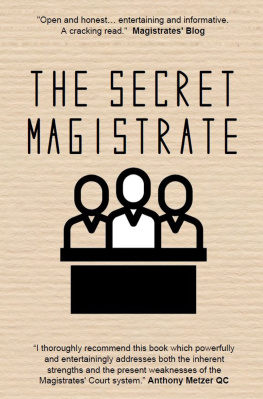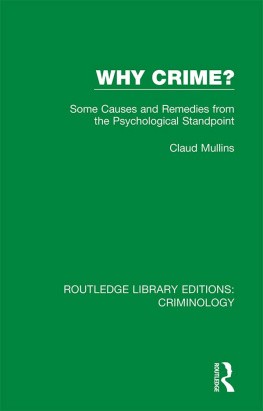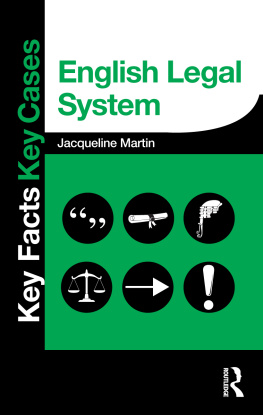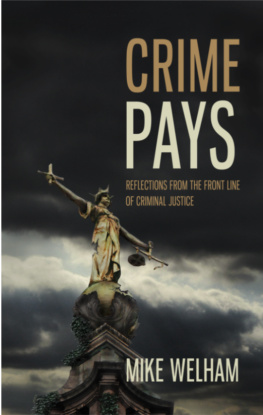THE SECRET MAGISTRATE
*
Secret Magistrate
*
Table of Contents
COPYRIGHT
First published 2020 by Hawksmoor Publishing
ISBN: 978-1-8380990-9-1
Kemp House, 152-160 City Rd, London, EC1V 2NX
www.hawksmoorpublishing.com
All Rights Reserved. No part of this publication may be reproduced, stored in a retrieval system, or transmitted in any form or by any means, electronic, mechanical, photocopying, recording or otherwise, without the prior permission of the publisher.
Hawksmoor Publishing does not have any control over, or any responsibility for, any author or third-party websites mentioned in or on this publication.
A CIP catalogue record for this book is available from the British Library.
This book is sold subject to the condition that it shall not, by way of trade or otherwise, be lent, re-sold, hired out or otherwise circulated without the publishers prior consent in any form of binding or cover other than that it which it is published and without a similar condition including this condition being imposed on the subsequent purchaser.
DEDICATION
This book is dedicated to my partner, the rest of my family, both two- and four-legged, and to everyone district judges, lawyers, legal advisers, list callers, defendants, witnesses and fellow magistrates who has provided the inspiration for this book.
FOREWORD
The volunteer magistrate, unpaid and not legally qualified, represents the community in the justice system. They represent a commitment to public service that is a very British value. That service has been offered for over 650 years and their courts were until recently a very visible sign of an accessible, public, open justice system through local courthouses.
Magistrates dont hide their job away; they are proud of the role they perform and their communities know who they are and what they do. Or do they?
I was a magistrate for 30 years until 2018 and never ceased to be surprised by the lack of understanding of their appointment process, role, responsibilities, powers and constraints. Most perceive them only vaguely through the reporting in the tabloids of either an allegedly lax sentence (almost certainly without the reporter being anywhere near the relevant courtroom, or perhaps any other, and who certainly hasnt bothered to understand the circumstances of the case), or a high-profile case that has been heard by a District Judge, mistakenly called the magistrate. Sadly, successive governments of all colours and persuasions have used this to attack, undermine, devalue and demoralise the institution.
This fascinating and highly readable book gives unique insight into all aspects of the work of criminal magistrates and their court and the satisfaction and frustration derived from working in it. To my knowledge, it is unprecedented in its range and detail. To the lay reader (and many who appear professionally in a magistrates court), it will demonstrate the breadth of matters that come before the entry tier of the criminal court system and how they are handled. These may only fleetingly include alleged murders, rapists and robbers but the pages can definitely still claim all human life is here. Readers will see why justice must always have a human face, and how much care, concern and dedication is expended in trying to do the right thing by society when dealing with increasing numbers from whom most in that society would prefer to turn away and see them as someone elses problem.
If it causes some readers to inquire more about the magistracy and even consider applying to join its ranks then that is all to the good. One of the principal claims to an ongoing central role in the justice system is that the magistracy must be able to demonstrate that it is indeed representative of the communities it serves age, gender, ethnicity, sexual orientation, socio-economic group, educational achievement all must be included in the search for the best people to do the job. Thats not to say that a defendant, witness or victim should expect to see someone like them on the bench in front of them thats neither possible nor desirable. All members of the judiciary must be scrupulously fair and even-handed in their administration of the law, and continually trained to ensure they keep that perspective. It is all of societys job to ensure that everyone feels they will be fairly treated in any court in England and Wales they are called before, irrelevant of the make-up of the particular tribunal. The magistracy, unique in its size, powers and unparalleled history will only deserve to survive if it has the authority and public confidence that comes from that diversity.
Perhaps, having read this book, more people will feel it right to ask the Ministry of Justice why they allowed the defenestration of such a great institution to occur. There is still time to rebuild it, though in the aftermath of the pandemic (assuming we can even be confident we have now reached the aftermath), there will be all too many excuses to duck the challenge.
Malcolm Richardson OBE. Chair, Magistrates Association, 2015-17
INTRODUCTION
I have been a magistrate for several years now, and sit regularly in an inner-city courthouse. Every criminal prosecution large or small starts its journey in a magistrates court, and the overwhelming majority end there too. In 2019, my 14,000 or so colleagues and I dealt with almost 1.4 million cases. We are truly at the coalface of English justice. It is a role that I take great pride in, and enormously seriously, and I work as hard as I can to improve my overall knowledge and competence.
As a result, I always take a keen interest in articles, blogs, and books on our Criminal Justice System. When, in early 2018, I heard on the grapevine about the imminent publication of a book by a renowned legal blogger The Secret Barrister who was telling it as it is about the law and how it is broken, I was one of the first in line to buy a copy.
As I turned the pages of this coruscating, witty, and forensically researched polemic spellbound and increasingly bemused and angry as more and more desperate stories unfolded about the iniquities and unfairness of the system, the drastic and draconian cuts to the Ministry of Justice budgets, court closures, and the decimation of the right to legal aid, amongst many others I found myself simultaneously nodding in agreement and shaking my head in anger and disbelief at the carnage that was being unveiled.
To a degree, I had already seen some evidence of the decay even when sitting in a magistrates court: the ever-increasing number of litigants in person deprived of legal aid and professional assistance, the number of cases delayed by court papers not being emailed to lawyers in advance, the late or total non-disclosure of evidence to the defence, behind the scenes foul-ups, lack of court staff, and even the broken down and unrepaired lifts, but nothing really prepared me for the devastating level of detail and vituperative attack that emerged in that book.
I came to Chapter 2, intriguingly titled The Wild West: The Magistrates Court, and so engrossed was I at the prospect of discovering so many new things that I decided to leave reading this until the end; after all, I thought I had a pretty good handle on magistrates and the job that we do, after the years of service that I had already put in.
By the time that I was ready to return to that chapter, my knowledge and level of understanding of the Criminal Justice System, and its alleged shortcomings, were significantly greater than when I began. I was enormously grateful to whoever The Secret Barrister is for lifting the lid on so many issues that in his or her opinion predicated against a smooth running and in some cases, perhaps even fair, courts system.







